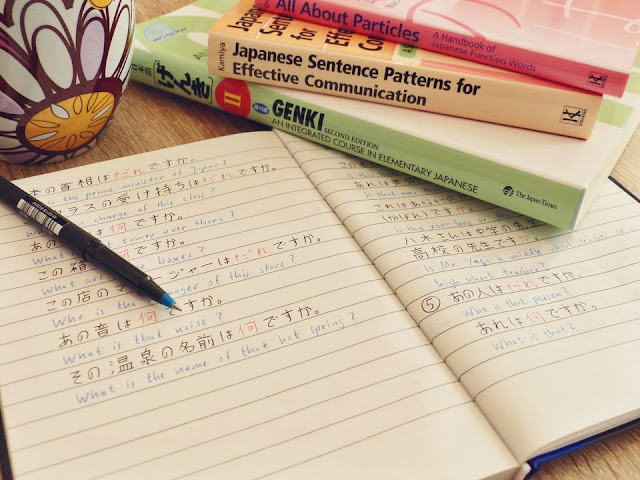My thoughts on grammar
Please note that I write about what works for me and share advice based on my own experiences. If you have a different opinion or if you use other methods, that's absolutely fine. Do whatever works for you.
. . .
When I learned my second language (English) at school, we did a lot of grammar exercises. Writing was hard because I focused too much on grammar rules. I wasn’t able to write correct sentences intuitively.
After graduation, I started to watch my favorite TV series in English because the new seasons weren't available in my native language. I also began to read blogs and forum posts about language learning in English. Over time, my English improved a lot.
I can use it intuitively now because I unconsciously internalized so many sentence patterns and expressions. At some point I stopped thinking about grammar rules and just trusted my feel for the language. This doesn’t mean that I never make mistakes, of course, but I can express myself quite well and without much difficulty.
In my experience, developing a strong feel for the language is necessary to write and speak in your target language. This is the foundation that enables you to intuitively feel what is right and wrong without thinking about grammar rules — similar to a native speaker. Native speakers usually can’t explain why but they notice when something sounds unnatural.
Why learning grammar at all?
Although there are language learners who love grammar, many people don’t really like learning grammar. Grammar can be complicated. If you try to remember grammar rules during your writing or speaking practice, you may feel like it slows you down. Plus, when you read manga or listen to native speakers, the way they speak is often different from your textbook. It seems like they don’t always follow the grammar rules you learned.
So, why not ignore grammar completely?
Even though I’m not a big grammar fan myself I combine grammar study with lots of input. Learning grammar in isolation doesn't work for me but learning through reading and listening alone is not enough either. Since it’s not always possible to figure out everything from context alone, reading grammar explanations from time to time can be very helpful. I think the combination of internalizing and imitating sentence patterns from native materials but also using textbooks and grammar books for clarification helps to build a good foundation.
I never memorize grammar rules. Instead, I read the grammar explanations, analyze the example sentences and write my own sentences by imitating these examples. Or I analyze sentences from japanese books that contain unknown grammar points. Consulting a grammar book from time to time is very helpful.
It's very important to get a feel for what makes a sentence right. Not necessarily by memorizing grammar rules but by understanding, internalizing and imitating a lot of correct and natural sentences. If you are a beginner, sentences from novels or movies are too difficult to understand at this stage. That’s why I recommend to start with a textbook. You don’t need to memorize the rules but you should read them and internalize the sentence patterns to get a feel for how the language works.
When you move on to graded readers and then to books aimed at native speakers you will have a good foundation. You need to expand this foundation through lots of input, of course, but in my experience a basic understanding of the language makes learning from native material much easier.
Observe carefully
Just because you don't find an expression used by a native speaker in your textbook doesn't mean that native speakers ignore grammar rules. Even if not everything can be found in a grammar book, most natives are following more or less the same rules (otherwise they wouldn’t be able to understand each other). Textbooks can’t teach you everything but they are a good place to start.
Natives may not be aware of grammar rules but they internalized the inner logic of their language as a child. Language learners need to carefully observe especially the unspoken rules before they can use certain sentence patterns or expressions. What kind of person uses this expression? Who is he or she talking to? In which situation and context is it used? Is it a joke, irony or sarcasm?
However, it’s not a good idea to mindlessly imitate everything you see or hear. When you are talking with a stranger, for example, it would be rude to use colloquial or even vulgar expressions. Maybe the sentence is from a TV show but just because it's a sentence from a native speaker doesn't mean it's appropriate in this situation.
Wait until you are more familiar with an expression or sentence pattern before you use it.
Learn only from correct examples
Be careful if you try to build your own sentences without actually knowing how a native speaker would express this thought. The risk is high that you’ll build a wrong or unnatural sentence. And the more you practice wrong sentences the higher the risk of internalizing these mistakes.
Making mistakes is part of the learning process and absolutely normal. You don’t need to speak or write perfectly to be understood. However, I think it's better to only use sentence patterns or expressions you actually heard (or read) from native speakers. The more you speak or write like a native speaker, the better natives can understand you.
I recommend not to practice something that is far above your level. Try to use sentence patterns that are familiar to you. In the beginning, try to imitate sentences from your textbook. Move on to graded readers and then to native material like novels or movies. If you don't know how to say or write something, try to find example sentences or ask a native speaker. Lots of input and (from time to time) reading grammar explanations and analyzing example sentences will improve your understanding of the language.
It's important to develop a strong feel for the language so that you can intuitively build correct sentences. But before you can do that, you need to internalize lots of correct/natural sentence patterns and expressions (+ when and how to use them). This way, you’ll slowly improve your ability to feel what is right and wrong. I don't think you need to memorize grammar rules but you should carefully observe how the language works and make sure that you only imitate correct/natural sentences.
. . .
There is no reason to stress yourself about grammar. However, even though I'm not a fan of grammar I don’t think language learners should ignore it completely. In fact, reading grammar explanations can make your learning process faster because you don’t need to find out everything by yourself. If you use it right, grammar is a tool that can make your learning process easier. That's why I think it’s worth it to add at least a light grammar study to your learning routine. There are many different ways to study grammar, not just the boring way we know from school. Try to find a way that works for you.




Comments
Post a Comment